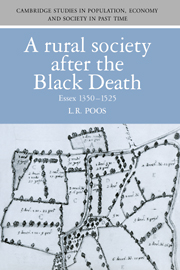Book contents
- Frontmatter
- Contents
- List of figures
- List of tables
- Preface
- Abbreviations
- Part I Reflections on a transitional era
- Part II ‘Country-dwellers, common folk and craftsmen’
- Part III ‘The total sum of all persons’
- Part IV ‘While it is so forward between us’
- Part V ‘She came that day seeking service’
- Part VI ‘Beware of such holy men’
- Part VII Synthesis
- Bibliography
- Index
- Cambridge Studies in Population, Economy and Society in Past Time 18
Part VII - Synthesis
Published online by Cambridge University Press: 14 September 2009
- Frontmatter
- Contents
- List of figures
- List of tables
- Preface
- Abbreviations
- Part I Reflections on a transitional era
- Part II ‘Country-dwellers, common folk and craftsmen’
- Part III ‘The total sum of all persons’
- Part IV ‘While it is so forward between us’
- Part V ‘She came that day seeking service’
- Part VI ‘Beware of such holy men’
- Part VII Synthesis
- Bibliography
- Index
- Cambridge Studies in Population, Economy and Society in Past Time 18
Summary
Surveying its immediate prologue from the vantage point of their own period, modern historians of early-modern England have often elaborated a presumptive paradigm of the corporate village community of the middle ages. In sketching this picture they draw in part upon the writings of medievalists, but they are also concerned with the motive forces of economic and social change that pervade the Tudor and Stuart centuries. Retrospectively viewed in this way, corporate communities with internal cohesion and little in the way of social or cultural differentiation gave way, between 1500 and 1750, to a changed rural social order. Pressure of expanding population during the long sixteenth century drove irrevocable economic wedges between layers of rural society. The English Reformation destroyed a syncretic medieval popular religion, and then Puritanism effected a further widening of culture and ethos between the godly and the multitude, riven further still as the soaring literacy of the former (at least among males) consigned the latter to a more sharply delineated inferior cultural status. A capitalist market economy promoted economic individualism, while the spreading tentacles of the early-modern state quashed local autonomy but afforded to parish notables new avenues of social control.
Such is the view that some historians have sketched when looking backward from the early-modern world. The view backward from that world is far from easy to comprehend. The fundamental nature of primary documentation for English local society changed enormously from the late-medieval to the early-modern period, a fact that conspires to raise correspondingly profound methodological issues.
- Type
- Chapter
- Information
- A Rural Society after the Black DeathEssex 1350–1525, pp. 289 - 293Publisher: Cambridge University PressPrint publication year: 1991



